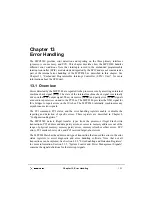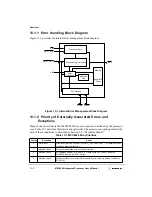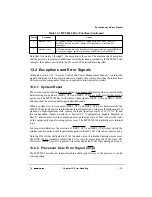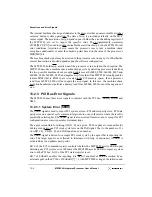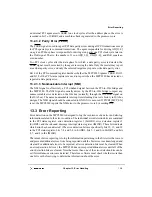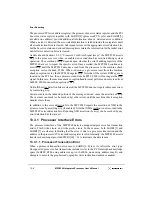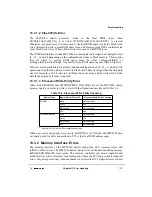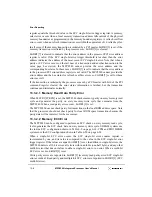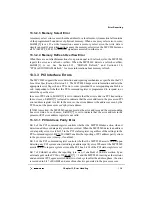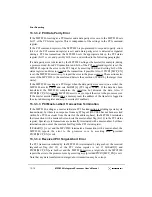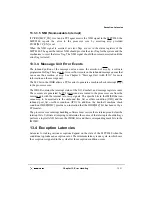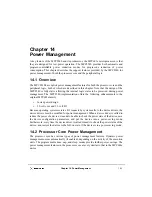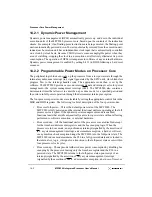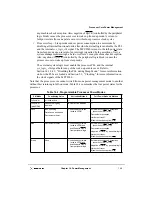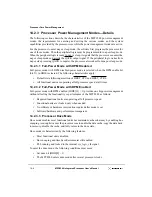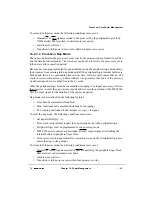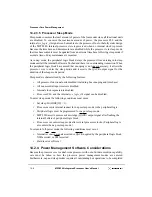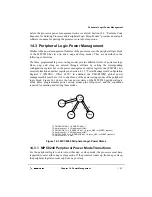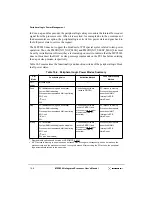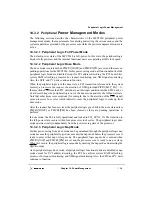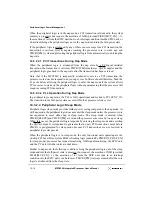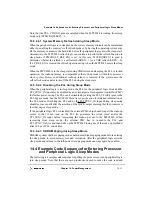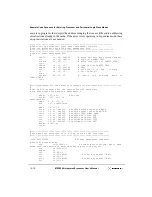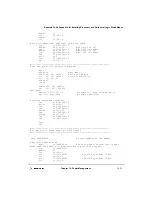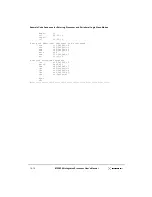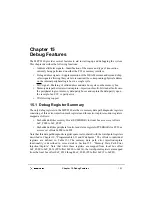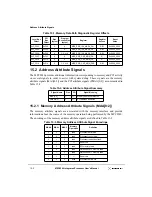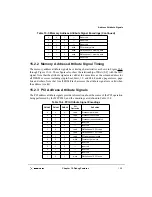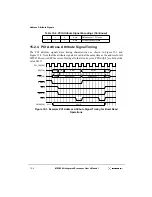
Chapter 14. Power Management
14-3
Processor Core Power Management
any machine check exception. Also, negation of QACK (controlled by the peripheral
logic block) causes the processor core to wake up from nap mode. A return to
full-power state from a nap state occurs within four processor clock cycles
•
Processor sleep—Sleep mode reduces power consumption to a minimum by
disabling all internal functional units, after which external logic can disable the PLL
and the internal sys_logic_clk signal. The MPC8240 returns to the full-power state
from sleep mode upon receipt of an interrupt (signalled by the assertion of int), a
system management interrupt, a hard or soft reset, or any machine check exception.
Also, negation of QACK (controlled by the peripheral logic block) causes the
processor core to wake up from sleep mode.
The external system logic must enable the processor PLL and the internal
sys_logic_clk signal before any of the wake-up events occur. Refer to
Section 14.3.2.4.2, “Disabling the PLL during Sleep Mode,” for more information
on how the PLLs are locked and Section 2.3, “Clocking,” for more information on
the clock signals of the MPC8240.
Note that the processor core cannot switch from one power management mode to another
without first returning to full-on mode. Table 14-1 summarizes the four power states for the
processor.
Table 14-1. Programmable Processor Power Modes
PM Mode
Functioning Units
Activation Method
Full-Power Wake Up Method
Full power
All units active
—
—
Full power
(with DPM)
Requested logic by
demand
By instruction dispatch
—
Doze
Bus snooping
Data cache as needed
Decrementer timer
Controlled by software
(write to HID0)
External asynchronous exceptions
(assertion of SMI or int)
Decrementer exception
Hard or soft reset
Machine check exception (mcp)
Nap
Decrementer timer
Controlled by software
(write to HID0) and
qualified with QACK
from peripheral logic
External asynchronous exceptions
(assertion of SMI, or int)
Decrementer exception
Negation of QACK by peripheral logic
Hard or soft reset
Machine check exception (mcp)
Sleep
None
Controlled by software
(write to HID0) and
qualified with QACK
from peripheral logic
External asynchronous exceptions
(assertion of SMI, or int)
Negation of QACK by peripheral logic
Hard or soft reset
Machine check exception (mcp)
Summary of Contents for MPC8240
Page 1: ...MPC8240UM D Rev 1 1 2001 MPC8240 Integrated Processor User s Manual ...
Page 38: ...xviii MPC8240 Integrated Processor User s Manual TABLES Table Number Title Page Number ...
Page 48: ...xlviii MPC8240 Integrated Processor User s Manual Acronyms and Abbreviations ...
Page 312: ...6 94 MPC8240 Integrated Processor User s Manual ROM Flash Interface Operation ...
Page 348: ...7 36 MPC8240 Integrated Processor User s Manual PCI Host and Agent Modes ...
Page 372: ...8 24 MPC8240 Integrated Processor User s Manual DMA Register Descriptions ...
Page 394: ...9 22 MPC8240 Integrated Processor User s Manual I2O Interface ...
Page 412: ...10 18 MPC8240 Integrated Processor User s Manual Programming Guidelines ...
Page 454: ...12 14 MPC8240 Integrated Processor User s Manual Internal Arbitration ...
Page 466: ...13 12 MPC8240 Integrated Processor User s Manual Exception Latencies ...
Page 516: ...16 14 Watchpoint Trigger Applications ...
Page 538: ...B 16 MPC8240 Integrated Processor User s Manual Setting the Endian Mode of Operation ...
Page 546: ...C 8 MPC8240 Integrated Processor User s Manual ...
Page 640: ...INDEX Index 16 MPC8240 Integrated Processor User s Manual ...

